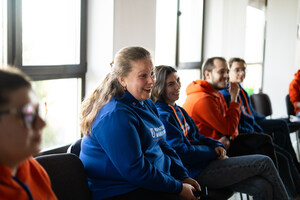
Put Children's Education at the Heart of Discussions at COP30 in Brazil
Education Cannot Wait and Geneva Global Hub for Education in Emergencies Call for Sustained Support
NEW YORK, Nov. 7, 2025 /PRNewswire/ -- Members of the Geneva Global Hub for Education in Emergencies (EiE Hub), including Education Cannot Wait (ECW), are calling on world leaders and other stakeholders to put children's education at the heart of discussions when they gather in Belém, Brazil for the COP30 climate summit in November 2025.
The climate crisis is having a devastating impact on children and youth's education, in particular the most at-risk and vulnerable. Globally, at least 242 million students – from pre-primary to upper secondary education – saw their learning disrupted due to climate-related events in 2024. Heatwaves alone affected more than 118 million children's learning just in the month of May 2024 alone. Climate-induced hazards and shocks can severely affect the quality of education, for example by damaging the learning environment or impacting teachers' well-being and capacity. Such interruptions expose children to critical protection risks, while also drastically increasing the chances of drop-out.
The impacts of climate change on education also exacerbate existing risks and inequalities, including related to gender, ethnicity, disability, age and displacement status. Rising temperatures and other climate-related stressors are aggravating other situations that can hinder access to education, such as armed conflict and violence, loss of livelihood opportunities, health impacts or child, early and forced marriage.
Despite this, education has long been chronically neglected in climate discussions and financing. From 2006 to March 2023, only 2.4% of financing from key multilateral climate funds supported projects incorporating child-responsive activities. Similarly, governments have often overlooked children's rights generally, and education specifically, in political strategies to tackle climate change. During the last cycle of Nationally Determined Contributions (NDCs 2.0), less than half of the NDCs met the standards for being child-sensitive.
Education is a powerful tool to tackle the climate crisis. Making education systems more climate-responsive will help create safe and effective learning environments and ensure learning continuity, while equipping students with the skills, knowledge and mindsets to promote climate-resilient families and communities.
At the same time, investment in education is a cost-effective tool to address the effects of the climate crisis. More broadly, a small investment can deliver returns for decades, fostering safer and more stable societies. Every USD 1 a government spends on education increases GDP on average by USD 20.
Without urgent action, tens of millions more children and youth risk missing out on education due to the climate crisis. This will have far-reaching consequences not just for their own lives, but for their wider communities' economic development, social cohesion and long-term stability.
The statement called on governments, civil society, philanthropy and other donors, as well as other actors to:
- Ensure that education is resourced and prioritised in national climate action strategies and related processes, including in NDCs and National Adaptation Plans (NAPs).
- Increase investments in climate resilient education strategies, leveraging opportunities for more strategic co-financing across sectors. This includes prioritising education for all children and youth—especially in climate-vulnerable, conflict-affected and fragile contexts—while enabling the continuity of learning and the resilience of education system.
- Ensure education is integrated in loss and damage strategies, assessments, costings and funding proposals of fragile and crises-affected countries.
- Enhance inclusion, participation and representation of children and youth in climate policymaking, including through child-friendly mechanisms in NDCs, NAPs and other climate plans.
- Invest in climate-resilient school infrastructure and climate-related teachings and learnings, for example by embedding green skills and climate education in national curricula, including in emergencies, to empower children, youth and teachers as agents of change for resilience, climate action and a just green transition.
SOURCE Education Cannot Wait






Share this article